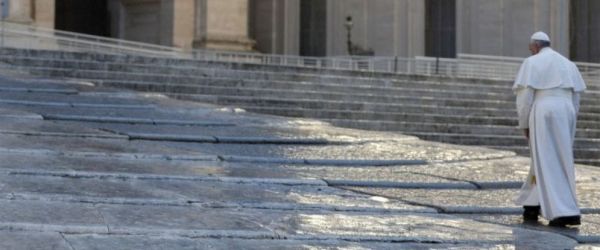"Everything is in the small things." God's style of acting in small things but opening up great horizons for us was the focus of Pope Francis' meditation during Mass celebrated at Santa Marta on Tuesday, 8 September, the liturgical memorial of the Nativity of Mary.
Referring to the text of the opening prayer recited shortly before — in which the Lord is asked for "the grace of unity and peace" — the Pontiff focused on two verbs already highlighted in his homilies of "recent days": to reconcile and to pacify. God, he said, "reconciles: he reconciles the world with himself and in Christ." Jesus, brought to us by Mary, the peacemaker, "gives peace to two peoples, and makes two peoples into one: the Jews and the Gentiles. One people. He makes peace. Peace in hearts." But, the Pope asked, "how does God reconcile?" What is his "style"? Perhaps he "holds a large assembly? Do they all agree? Do they sign a document?" No, he replied, "God pacifies in a special way: he reconciles and pacifies in small ways and along the way."
Francis' reflection then began with the concept of "small," that "small" mentioned in the first reading (Micah 5:1-4): "And you, Bethlehem of Ephrathah, so small..." This was the Pope's comment: "So small: but you will be great, because your leader will be born from you and he will be peace. He himself will be peace," because from that "small" "comes peace." This is God's style, who chooses "small things, humble things to do great works." The Lord, the Pope explained, "is the Great One" and we "are the little ones," but the Lord "advises us to make ourselves small like children in order to enter the kingdom of Heaven," where "the great, the powerful, the proud, the arrogant cannot enter." God, therefore, "reconciles and pacifies in the small."
The Pontiff then addressed the second concept, according to which the Lord reconciles "even on the way: walking". And he explained: "The Lord did not want to pacify and reconcile with a magic wand: today — bang! — everything done! No. He set out to walk with his people". An example of this action of God can be found in the Gospel of the day (Matthew 1:1-16, 18-23). This passage, the genealogy of Jesus, may seem a little repetitive: "This begot this, this begot this, this begot this... It is a list," Francis pointed out. Yet, he explained, "it is God's journey: God's journey among men, good and bad, because in this list there are saints and there are criminal sinners."
A list, therefore, where we also encounter "much sin." However, "God is not afraid: he walks. He walks with his people. And on this journey, he increases the hope of his people, the hope in the Messiah." This is the "closeness" of God. Moses said to his people: "But think: what nation has a God as close to them as we do?" So "this walking in small ways, with his people, this walking with the good and the bad, gives us our way of life." To "walk as Christians," to "pacify" and "reconcile" as Jesus did, we have the way: "With the Beatitudes and with that protocol by which we will all be judged. Matthew 25: 'Do this: small things.'" This means "in small things and on the journey."
At this point, the Pope added another element. The people of Israel, he said, 'dreamed of liberation', they had 'this dream because it had been promised to them'. Joseph also 'dreams', and his dream 'is a bit like a summary of the dream of this whole story of God's journey with his people'. But, Francis added, "it is not only Joseph who has dreams: God dreams. Our Father God has dreams, and he dreams beautiful things for his people, for each one of us, because he is a Father and, being a Father, he thinks and dreams the best for his children."
In conclusion: "This almighty and great God teaches us to do the great work of pacification and reconciliation in small ways, on our journey, without losing hope in that ability" to have "great dreams" and "great horizons."
Therefore, the Pontiff invited everyone — in this commemoration of the beginning of a decisive stage in the history of salvation, the birth of Our Lady — to ask for "the grace we have asked for in prayer, for unity, that is, for reconciliation and peace." But "always on the journey, in closeness with others" and "with great dreams." With the style of the "small", that smallness, he recalled, which is found in the Eucharistic celebration: "a small piece of bread, a little wine...". In "this 'smallness' there is everything. There is God's dream, there is his love, there is his peace, there is his reconciliation, there is Jesus".
[Pope Francis, St. Martha, in L'Osservatore Romano 09/09/2015]












